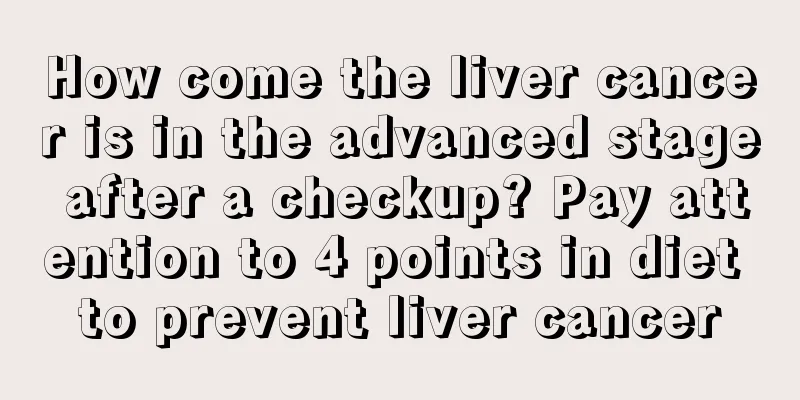How come the liver cancer is in the advanced stage after a checkup? Pay attention to 4 points in diet to prevent liver cancer

|
Liver cancer has become the type of cancer with the highest incidence rate in the country. Many liver cancers will have some symptoms, big or small, but some people do not show any symptoms. However, once there is a small problem, it is found to be liver cancer. Therefore, we must be vigilant about liver cancers without symptoms. Liver cancer susceptible population: He ate well and slept well, had no jaundice or ascites, but when he was checked, he was diagnosed with advanced liver cancer! What's more, his brother had just been diagnosed with liver cancer, and he accompanied him to the treatment and had a checkup, and it turned out that he also had liver cancer! If you experience symptoms such as weight loss, yellowing of the face, and loss of appetite, you should be alert to the possibility of liver cancer, but the absence of the above symptoms does not necessarily mean that you are fine. In fact, the early symptoms of many tumors, including liver cancer, are very vague or even absent, and once they are discovered, they are often already in the late stage, making it difficult to take radical treatment. Experts remind citizens: liver cancer is particularly prone to "family members". If a blood relative is sick, it is best to be vigilant and have regular checkups. Reminder: It is best for susceptible people to have an ultrasound every six months People with a history of hepatitis B, a family history of liver cancer, drinking alcohol, and those who like to eat pickled foods in daily life are all susceptible to liver cancer. It is best for such people to undergo an ultrasound examination every six months to detect the disease in time. It is especially worth mentioning patients with a family history, because liver cancer seems to favor "family members", which may be due to the genetic susceptibility of the disease itself. Recently, there have been many cases of the same family suffering from cancer one after another, and even two brothers were on the operating table for liver cancer surgery at the same time. The occurrence of tumors is caused by external factors acting through internal factors. The same genes and similar living habits make many types of tumors, including liver cancer, favor the same family members with blood ties. Case: Liver cancer has reached the late stage but no obvious symptoms Mr. Cai, who is in his seventies, has always felt that he enjoys eating and is in good health. As a result, even after more than ten years of retirement, he has never participated in the free physical examination organized by his unit. Some time ago, Mr. Cai frequently got up at night to urinate, and suspected that he had prostatitis, so he went to the hospital for treatment. The results of the examination were shocking: Mr. Cai also suffered from high blood pressure, diabetes, kidney cysts, prostatitis, and liver cancer. Even more unfortunately, the liver tumor had invaded the portal vein, and the liver cancer had developed to the late stage. After learning the test results, Mr. Cai and his family were very confused. He had no pain in the liver area, no jaundice, no ascites, and a strong appetite. How could he be diagnosed with advanced liver cancer? Why didn't he show any signs before? Analysis: Various diseases can mask tumor symptoms In clinical practice, many patients have the same misunderstanding as Cai Bo: they think that it is impossible to have a tumor without symptoms such as weight loss, jaundice, ascites, and loss of appetite. In fact, in reality, many tumors lack typical symptoms in the early stages, and even in the late stages, and by the time they are diagnosed, they have already lost their therapeutic significance. Whether a tumor has entered the late stage does not depend on whether the patient has symptoms, but on factors such as liver function, tumor size, whether it has invaded blood vessels, and whether it has metastasized. Many liver cancer patients have developed to the late stage but have no clinical symptoms. There may be many reasons: First, the patient's liver has good compensatory function. For ordinary people, generally speaking, as long as there is 30% of the liver, it is enough to maintain the normal functioning of the human body. Although the tumor has invaded the liver and even the blood vessels, as long as 30% of the liver is not affected, there will be no symptoms. This does not mean that the patient can sit back and relax, because the tumor grows very fast. When the tumor cells invade the liver, symptoms such as jaundice and ascites will appear, and by then the treatment will be difficult to be effective. Secondly, if the patient's tumor happens to grow in the center of the liver, and the liver volume has not increased significantly, the tension of the liver capsule is not high, and the surrounding nerves are not affected, there may be no pain. If the cancer thrombus has not invaded the portal vein, or has invaded the portal vein but has not completely blocked it, there will be no ascites. Diet to prevent liver cancer 1. Drinking water should not be polluted. Drinking water with chemicals can easily cause cancer. Tap water is not necessarily clean. There are water tanks on the roofs of buildings with more than 5 floors. The water tanks should be cleaned by a dedicated person. It is best to perform secondary disinfection. The water tank body should also use chemicals that will not pollute water. 2. Supplement selenium appropriately. For people with low selenium levels, selenium-enriched yeast, selenium polysaccharides, and selenium-enriched salts can be used to supplement selenium and improve blood selenium levels. 3. Reduce the intake of nitrosamines and quit smoking and drinking. Smoking and drinking are also bad for fatty liver. Drinking wine, beer, and a small amount of alcohol can promote blood circulation and remove blood stasis. In fact, this is not true. Alcohol is harmful to the human body. The gastric mucosa in the stomach has a protective effect on the human body. Alcohol can digest the gastric mucosa, injure the cells of the stomach, and the toxic substances in the food are easily absorbed by the stomach. This can easily cause alcoholic hepatitis, reduce the immune function of the liver and the whole body, and damage the detoxification function of the liver. This is why people who drink have poor detoxification function and are prone to alcoholic cirrhosis, and some cirrhosis will turn into liver cancer. 4. Prevent hepatitis. Using hepatitis vaccines to prevent hepatitis and thus liver cancer has become one of the most promising ways to prevent liver cancer. Not only should children be vaccinated with hepatitis B vaccine when they are born, but adults who have not been vaccinated with hepatitis B vaccine and have not had hepatitis can also be vaccinated with hepatitis B vaccine. However, it is estimated that it will take decades to see the effect. In addition to the hepatitis B vaccine, attention should also be paid to the control of other transmission routes, such as diet, surgery, blood transfusion, injection, acupuncture and hairdressing. |
Recommend
What can I drink regularly to lighten spots
Although it is very normal to have spots on the f...
Tips and methods for driving in snowy weather
Driving in the snow is actually a very dangerous ...
I always have insomnia at night and my mind is full of random thoughts
There are many ways to treat insomnia. The most i...
Is physical height increase effective?
I believe that many female friends usually use ph...
How about fruit and vegetable enzymes
People pay more and more attention to physical he...
What causes concussion?
Patients with concussion will experience symptoms...
Prostate cancer is actually not scary
Prostate cancer diagnosis: Prostate cancer is a t...
How to get rid of acne mites
The types of acne that each person develops are c...
Degenerative changes of the thoracolumbar spine_Degenerative changes of the thoracolumbar spine
I believe that many people do not know the cause ...
Is coronary angiography painful?
Coronary angiography is an auxiliary means of tre...
What is glycosylated hemoglobin?
Everyone knows hemoglobin. When you go to the hos...
TCM Syndrome Differentiation and Type Cure for Laryngeal Cancer
Aunt Zhang's health is not very good. She sta...
How to remove hair balls from clothes
Sweaters can be said to be indispensable in our w...
The most effective way to prevent mosquito bites_The most effective way to prevent mosquito bites
After being bitten by a mosquito, people will bec...
In severe cases, the late stage symptoms of intestinal cancer often occur when the stool is constipated
If colorectal cancer develops to the late stage, ...









